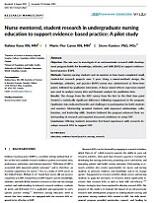Douglas College Research and Innovation Office (Research Incentive Grant)
Related Works
Content type
Digital Document
Abstract
The aim was to investigate if an extracurricular research skills development program builds the knowledge, attitudes, and skills (KAS) to support evidence-based practice (EBP). Twenty nursing students and six mentors in four teams completed small, student-led research projects over 1 year. Using a mixed-methods design, the knowledge, attitudes, and practice (KAP) survey was administered at three-time points, followed by qualitative interviews. A linear mixed-effects regression model was used to analyze survey data and thematic analysis for qualitative data. The change from the KAP survey from the first to the third time point showed a statistically significant difference following engagement in the program. Qualitative data indicated benefits and challenges to participation for both students and mentors. Mentorship provided students with improved relationships, collaboration, and leadership skills. Students believed the program enhanced their understanding of research and reported increased confidence in using EBP.
Acknowledgements: This study was supported by the Douglas College Research Incentive Grant. The author was a participant in the 2021 National League for Nursing (NLN) Scholarly Writing Retreat, sponsored by the NLN/Chamberlain University College of Nursing Center for the Advancement of the Science of Nursing Education.
Origin Information
Content type
Digital Document
Abstract
<p>The present study, one of the first of its kind in Canada, documents existing access to menstrual supplies at a Canadian mid-size post-secondary institution, and the impacts on students’ capacity to pursue an education. The study consists of a complete audit of all campuses and near-campus facilities in the Fall of 2019, and a survey of 370 students between March 2020 and July 2020. Study results show that existing availability on campus of disposable single-use tampons and pads is inadequate, problematic, and expensive. Dispensers do not work or cannot be found, campus stores charge high prices and overtax the items, and it is a long walk off-campus to buy from the nearest store. Study participants reported unexpected periods and menstrual spills, leaks, and stains on a frequent basis. Students report resorting to make-shift, ad hoc solutions in order to remain on campus, such as using toilet paper as a temporary pad. Some participants reported academic penalties, missing class, or leaving campus to go home due to lack of menstrual supplies. Overall, existing menstrual supplies on campus reflect outdated societal expectations for menstruation to be managed at the individual level. Poor availability of menstrual supplies on campus is a barrier to full participation in post-secondary education and campus life. Study results indicate the need for post-secondary institutions to classify menstrual products as ‘essential’ items to be included in restrooms, in line with toilet paper, hand soap, hand- drying facilities, sanitary bins, and urinals. This approach would equalize the support and convenience of restrooms for both sexes and eliminate the need for students to take money or their own supplies into the restroom. Providing support for menstruation on campus will help all people who menstruate as they pursue higher learning.</p>
Origin Information


